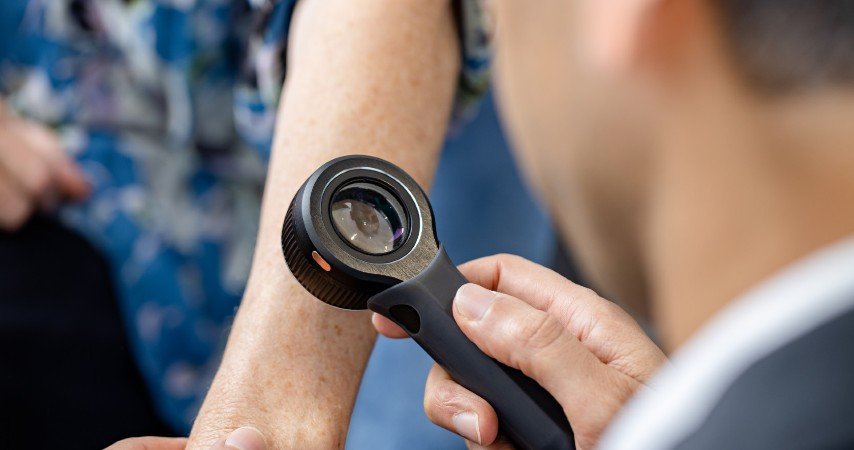
Melanoma is the 4th most common skin cancer usually occurring on regions of the body which have been exposed to the sun. Melanoma is a serious cancer because in some patients it can spread to lymph nodes and distant organs causing illness and death.
Australia and New Zealand have the highest incidence of melanoma in the world due to a high proportion of people of Anglo-Celtic heritage and regular sun exposure.
Melanomas usually present as a mole or spot on the skin which has undergone some recent change. It may also occur beneath your nails, on mucous membranes or in the eye.
Self examination is useful and it is a good idea to ask your partner or family member to look at difficult places like the scalp or your back. If you would like a skin check your general practitioner is a good first point of call to guide you with this.
Melanoma is diagnosed by a pathologist after performing a biopsy.
When melanoma is diagnosed it is staged according to its thickness and other features. Melanoma of a specific thickness can spread to lymph nodes and distant organs. If this is the case further investigations are recommended and can include blood tests, CT scans, PET scans and MRI scans.
The primary treatment for melanoma is surgical excision with a margin of normal tissue 0.5cm-2cm depending on the thickness of the melanoma. The defect which remains may require a skin graft or local flap for closure. Melanomas of a certain thickness are further investigated using a technique called a sentinel lymph node biopsy. This is a lymph node sampling technique performed at the time of the definitive surgery to test for spread to the lymph glands.
Following surgical treatment for melanoma you may be referred to a medical oncologist to discuss medical therapy as an adjunct to the surgery. Melanoma patients are followed up at regular intervals to assess for the development of metastatic disease or new melanomas. This may be with your surgeon, dermatologist or GP.
At your consultation the diagnosis and recommended treatment plan will be explained to you. We treat patients according to the Australian guidelines for melanoma. If you require an urgent biopsy this will be arranged before definitive treatment planning.
Some surgery is performed under local anaesthetic in our day surgery while other operations require a general anaesthetic and inpatient stay. We will arrange the treatment follow up and any referrals for you, while keeping your GP and/or referring doctor informed.
Melanoma can be a life threatening illness and we are mindful of the anxiety this causes. At Plastic Surgery Central we endeavour to provide your diagnosis, investigations and treatment in the most timely fashion while ensuring the highest quality of care.
Generally surgery for melanoma is rebatable through Medicare and standard private health insurance. This does require a referral from your family doctor.
After your consultation, a detailed quote will be provided to you including the surgeon fee, anaesthetic fee, and hospital fee.
You can use this form to request a call back.
Please be aware that all surgical procedures require a consultation with our plastic surgeons to allow a thorough assessment and discussion of your specific needs.








Plastic Surgery Central
235 Greenhill Rd
Dulwich SA 5065